- Home
- Roddy Doyle
Brilliant Page 6
Brilliant Read online
Page 6
“Maybe it’s just something we think we can see,” she said.
But, as Gloria spoke, they watched the cloud sink to the street, and it stopped being something they thought they’d seen and became something solid and real that they could definitely see. The cloud had black streaks that looked like legs. They touched the ground.
“The Dog!”
“Oh my God!”
A big black dog. A big, ordinary dog—they could even hear his paws smack the ground as he ran away.
What they’d just seen, a strange cloud changing into a black dog, was frightening, nothing close to anything Gloria and Raymond had ever seen before. But the result of the change was far less terrifying. The Black Dog was scary—but he was still just a dog.
“Come on!”
They ran down a road that was a steep hill, where cars leaving the shopping center rolled onto the main road, back to Dublin or away in the other direction, to the country. There were no cars or trucks now, though—it was too late. They had to slow down because the slope was making them go too fast. Their chests and heads were going ahead of their legs, and they’d have toppled over. They could see the Dog clearly under the streetlights. They could see his coat gleaming, like he was healthy and well looked after.
Gloria knew which way they were going. She knew she lived in Dublin West and that the rest of Dublin was to the east. She’d learned that in school. She’d followed the main road, the N4, on the map with her finger, from where she lived to the city center. She’d loved it, that you could see a real place, a place as big as Dublin, on a page that fit into a schoolbook. They were running east now, toward the city—or “town,” as their parents always called it. Farther east, there was Dublin Bay and the sea. The River Liffey flowed east too. It was beside them, somewhere near, to their left—although Gloria couldn’t see or hear it. They wouldn’t see the river till they got to town, but Gloria didn’t know if they’d have to go that far before they caught up with the Black Dog. She didn’t know—she just ran.
Raymond was the first to run off the sloping road and onto the N4. “This is great,” he thought. “I’m doing something.” He was chasing the Dog. He wasn’t sure why, exactly. It wasn’t as clear as that. He just knew that the Dog had the funny bone. He couldn’t see the bone sticking out of the Dog’s mouth, and he hadn’t seen it earlier, when the Dog had climbed out of the cloud.
But, for now, that didn’t matter. He was chasing the Dog. He was saving his Uncle Ben.
There were cars here, all going in the same direction as Gloria, Raymond, and Ernie. They were running on the hard shoulder—that was what the side of the road was called. The car lights lit the Dog ahead of them. They hadn’t been running for long, so Gloria had plenty of breath for talking.
“Why’s it called the hard shoulder?”
She asked Ernie, because he was the oldest.
“Haven’t a clue,” said Ernie. “’Cos it’s hard, I suppose.”
“Maybe it’s called that because you’d break your shoulder if you fell on it.”
“Nice one,” said Ernie.
Raymond was well ahead of them now.
“Hurry up!” he shouted back.
“What’s his problem?” said Ernie.
“He’s right,” said Gloria. “Come on.”
Raymond could hear his sister and Ernie catching up. He didn’t want to be by himself when he caught up with the Dog. But he wasn’t scared—not really.
“Sorry, Rayzer.”
It was Gloria beside him, puffing from the effort. Ernie was beside him too. But he wasn’t moving his arms or feet. He was standing straight, like a statue, but rolling along beside them.
“Are they skates?” Raymond asked, and he pointed at Ernie’s shiny shoes.
“Not at all,” said Ernie. “I just keep forgettin’ I can do this.”
“Do what, Ernie?”
“Dunno,” said Ernie. “I suppose you’d call it glidin’.”
“Deadly.”
“Yeah,” said Ernie. “One of the perks of the job.”
“Can you carry me?”
“I can, yeah,” said Ernie. “But I won’t.”
They stopped talking then. They weren’t tired yet—not nearly—but talking took too much breath and energy. And the passing traffic was hard work too. The cars and trucks cut through the air and sent invisible waves that shoved right against them and nearly pushed them off the hard shoulder. Paper flew around them, and empty plastic bottles bounced between their feet. But it didn’t stop or slow them down.
They didn’t speak. They kept going and they kept up with the Dog. Small stones flew from under car wheels and shot past, low, sometimes whacking their shoes and trouser legs. But it was good, Raymond and Gloria decided, although they didn’t say it to each other. The stones, the bottles, and the trucks—they were all trying to slow them down, to stop them. But they couldn’t, because Gloria and Raymond wouldn’t let them. They were fighting, and winning. A sharp little stone nipped Gloria’s ankle, but she didn’t care. She was doing this for her Uncle Ben. A stinging ankle didn’t matter.
Sometimes they seemed to be catching up, even though they were getting a bit tired now and Ernie had forgotten that he could glide. His shiny vampire shoes were a bit big for him and they were slapping the road as he ran. Sometimes the Dog seemed to be getting away, but they could still hear him—his breath and his paws on the road—just ahead.
Gloria had a thought.
“Is he letting us chase him?”
Raymond had been thinking the same thing.
“Don’t know,” he said. “Maybe.”
“But why?”
“Don’t know.”
“It might be a trap,” said Ernie.
“Yeah,” said Raymond. “But what kind?”
“The usual,” said Ernie.
“What’s that?”
“One you get caught in.”
But they kept running. Trap or no trap, they still had to catch the Black Dog.
They could see the Phoenix Park ahead, and the shape of the trees. They were surprised, and pleased. It usually took ages to get this far in their dad’s car. But there it was, just ahead. The trees were a blacker shape against the black of the night sky.
“What’s that noise?”
They could hear other feet, other shoes hitting the ground, behind and nearly beside them—a few at first, then more. Gloria slowed down, so she could look.
“What’s going on, Rayzer?”
They began to see the other kids. They came running out of the dark. There were two of them, then four, eight—more.
Boys and girls, brothers and sisters, like Gloria and Raymond, and others by themselves. No grown-ups. All kids—children.
All of them were running.
And Gloria knew: They were all chasing the Black Dog.
CHAPTER 8
But the Dog was gone.
“Where is he?”
They could still hear his paws slapping the ground, but they couldn’t see him.
“Where is he, Rayzer?”
Raymond didn’t know.
It was a shock—and frightening.
They all slowed down. They couldn’t see anything, just the road and the traffic. There was nothing to follow. Running had stopped making sense.
“I don’t like this,” said Gloria.
Raymond agreed. “Yeah.”
They’d been in control, following the Dog, trying to catch him. But they weren’t in control anymore.
The Dog was.
They were near town now, on the stretch of road that led down to Heuston Station and the River Liffey. They all stood there looking at one another. It was hard to tell how many kids there were. Gloria was counting them. There were more than twenty, and she thought there were more behind the ones she could see.
Gloria whispered to Raymond again.
“Do they all know Uncle Ben?” she asked.
“No,” said Raymond. “No way. We’d know them if
they did.”
He looked worried.
“Wouldn’t we?”
“I know!” said Gloria. “They all have uncles of their own.”
“Yeah,” said Raymond. “That makes sense.”
Then they felt it—the cold. It was the cold they’d felt earlier, just after they’d left their house and recruited Ernie. It was the same sliding cold, the freezing, invisible animal. But it was even colder now, and harder. Gloria could feel it pushing against her legs. Everyone felt it. The cold was telling them which way to look, which way to go—pushing them.
They all started to run, as if they were obeying an order. They turned left, off the main road, and went over a bridge. They were crossing the Liffey, but they didn’t stop to look. Phoenix Park was right in front of them, like a cliff of huge trees rising out of the ground as they got nearer. There was another road running beside the park, and a junction. They could go left or right.
They all slowed down. They hesitated.
“Which way now?”
“Where’s the Dog gone?”
Gloria heard a voice: “Left.”
They started to run again. They all turned left, all obeying the voice. Gloria had definitely heard it. She was sure it had been a woman’s voice, the kind of voice a nice teacher would have had.
But there was no woman there. She looked back as she ran, but all she saw was a cat, a black one. It was sitting on a pillar, and it was looking at Gloria.
But it was only a cat.
She kept going.
They were running through the gate, into Phoenix Park. Their parents would have gone mad if they’d seen Raymond and Gloria going into the park in the middle of the night. They’d have been grounded for weeks, or for months, forever. And again Gloria wondered.
“Why is the Dog letting us chase him?”
No one answered.
They kept running, up a steep path. It was darker now because there were trees on both sides of them, blocking the moon, and they were running away from the streetlights.
Raymond hated it. He hated the fact that he was running straight into darkness, with even more darkness behind it, miles of darkness—Phoenix Park was one of the biggest parks in Europe. He was running away from the lights and traffic sounds and the other sounds of the city. He didn’t want to shout “Brilliant.” He didn’t want to be the first to do it. He was one of the oldest kids there. He’d had a quick look around and nearly all of the others looked smaller than him. He didn’t want them to know he was afraid of the dark. They’d laugh at him, and run past him, leave him alone at the edge of the darkness. He couldn’t let them know. But he knew why he was there. He recited it quietly as he breathed in and out. “Uncle Ben . . . Uncle Ben . . . Uncle Ben.” He ran into the dark.
They had to be careful because the ground was rough and it was hard to see it clearly.
“Why are you chasing the Black Dog?” Gloria asked the girl who was running beside her.
“My mam,” said the girl.
“Oh,” said Gloria. “Is she depressed?”
“Yeah,” said the girl. “She’s down in the dumps, like. My auntie said something about getting the Black Dog off her back. And then I seen him.”
“Me too,” said a boy. “My da stays in bed all day since his job got shut down.”
The boy was panting. They were still running along the path, up a hill.
“The Black Dog blocks the bedroom door,” said the boy.
“Have you seen him?” Gloria asked.
“My da?”
“The Black Dog.”
“No,” said the boy. “But my da has.”
“I’m Gloria, by the way,” said Gloria.
“Paddy,” said the boy.
“I’m Suzie,” said the girl.
They kept puffing up the hill.
“Where’s the Dog now, but?” Gloria asked.
There was still no sign of him. They couldn’t hear him, either. All they could hear was the wind in the trees and their own breath.
They all stopped running. They listened.
Then they felt it again, the rush of cold wind. It went right past them, up close. Then it came back, on the other side. It pushed them—it seemed to—off the path, onto the high grass.
Then they could see it, the darker shape in the darkness, going into the trees. They heard paws going through the grass—and panting. The panting that only dogs make. And they could see the Dog. He barked—he yapped—just before he disappeared into the extra darkness of the trees. He barked like a normal dog, like a dog that liked to play and loved being chased.
“Come on!” Raymond shouted.
They started to run at the trees. Then they heard a voice.
“Be careful!”
“Oh my God! Who said that?”
“None of us,” said Raymond. “It was an old man’s voice. Come on!”
He noticed the owl as it flew over their heads. He’d never seen one before, except on TV. But he didn’t stop to look. He kept running. He made sure he was at the front.
The owl landed on a branch high above the children. He settled beside another owl.
“They wouldn’t listen to me,” he said.
“That’s young people for you,” said the other owl. “You were like that yourself once.”
“Ah, lay off,” said the first owl.
“Anyway,” said the second owl. “They have to work this out for themselves.”
“You’re right,” said the first. “But I’m worried.”
“So am I,” said the second. “But we have to trust them.”
“I know,” said the first.
He sighed.
“I know.”
The kids were in among the trees. And lost. They were stepping among tangled things, trying not to trip. They weren’t really a group anymore, and, one by one, they began to realize it. They looked left and right but saw no one. They could hear panting and grunts in front and behind them. But in the pitch dark, being grabbed at by twigs and tripped by things on the ground they didn’t want to see and sometimes seemed to scurry, they all felt very alone.
Every careful step she took, Gloria expected to be tripped by a tree stump or brambles or—the word popped into her head—undergrowth. She was starting to feel trapped. She looked around but she couldn’t see anyone.
“Hello?”
Raymond thought he was being grabbed by branches. They held onto his clothes and wouldn’t let go. He wanted to shout, to answer Gloria, but he couldn’t.
Paddy knew there were no snakes in Ireland. He’d always known that, since even before he’d started going to school. He’d even been named after the saint who’d got rid of all the snakes.
Saint Patrick had rounded up the snakes and he’d kind of bullied them, his da had told Paddy, right into the sea. But then his teacher, Mad Miss Delaney, had told them about people who’d bought snakes—“during the boom,” she’d said. They’d got them as pets and then they’d released them into the “wild” because they couldn’t afford to feed them anymore. Only, there was no real “wild” in Ireland, Mad Miss Delaney had said, no desert or jungle for a snake to get lost in. “And that’s the problem,” she’d said. “There are snakes in Ireland. There are lots of snakes in Ireland. Whole families of them. Even in the Phoenix Park.”
Paddy was terrified. But he kept going. He was doing this, walking over the snakes, for his da. He wanted his da back—the happy man Paddy had known all his life. Until a year ago, when his da came home from work and told them all—Paddy and his little brothers, and his ma—that there was no more work, that the building site was closed, the gate was chained and locked, and his tools were locked inside. He’d been okay at first—his da. It had actually been good, because his da was at home more of the time. He was a better cook than his ma; even she admitted it. And he’d sometimes meet Paddy and his brothers outside the school, with a ball under his arm, and they’d play football in the park for an hour before they’d walk home. But then the Blac
k Dog arrived. Paddy didn’t see him, but he knew something was wrong. His da was staying in bed in the mornings, and he was getting skinny and old looking. His ma looked sad and worried. He heard the woman next door, Mrs. Brennan, say something about a black dog bringing depression into the house, and his ma said it was like the Black Dog was stretched out in front of the bedroom door, blocking it, and stopping his da from getting out and living again. Then Paddy saw the Dog—last night.
He was stuck. He couldn’t move. There was something strong pulling the back of his jacket, and his feet were up against something big that he couldn’t see. Paddy could feel it push against his knees, like it was trying to trip him. He was afraid it would move and become one of those huge snakes, a python—a boa constrictor. They ate things whole. They choked them first, then swallowed them—animals, even big ones, birds. People. Paddy couldn’t move. He couldn’t shout—his throat was too dry and tight.
Suzie was lost. Really lost. She could see nothing now. Absolutely nothing. It was like being locked in a cupboard. But cupboards were warm and always stayed the same shape. This was different. This was frightening.
But she kept going. She took another step. She felt a breath at her face. It stank. But she didn’t scream. She stayed calm—she tried to. She thought of her mam, before the Dog had got into the house. That was what had happened, her Auntie Nuala had told her. “Depression,” her auntie had said, “is like a big heavy black dog on your back.” Her auntie showed her. “Right across your shoulders and neck, even your head.” But Suzie couldn’t see the Dog. It annoyed her and upset her. She wanted to push the Dog out of the house. But it was invisible; she couldn’t see it near her mam. Until last night.
She couldn’t move. Her foot was caught in something.
She called out.
“Here!”
But no one answered.
The others were lost or stuck, surrounded by things that they couldn’t see. Some of them were so frightened and anxious, they couldn’t remember why they were there. It was like waking up in a bad dream, instead of escaping from it. All of them, Gloria and Raymond too—even Ernie—had had this dream before, being trapped in a dark, cold jungle. But this wasn’t a dream, and they weren’t going to wake up. Because they were already awake.

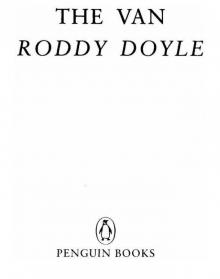 The Van
The Van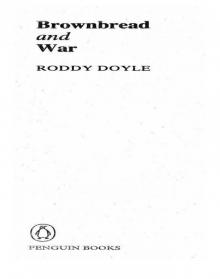 Brownbread & War
Brownbread & War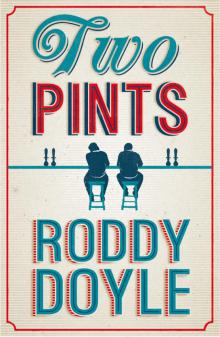 Two Pints: A Collection
Two Pints: A Collection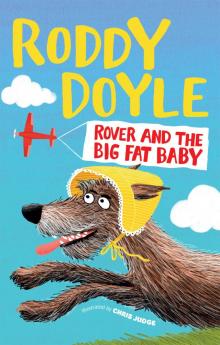 Rover and the Big Fat Baby (Giggler 4)
Rover and the Big Fat Baby (Giggler 4)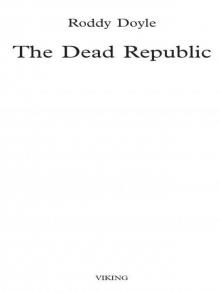 The Dead Republic
The Dead Republic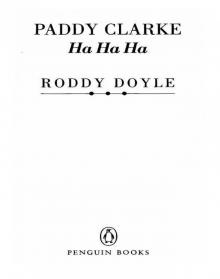 Paddy Clarke Ha Ha Ha
Paddy Clarke Ha Ha Ha The Commitments
The Commitments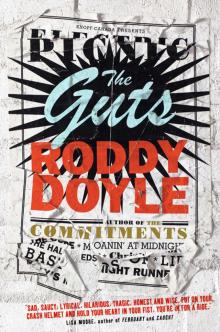 The Guts
The Guts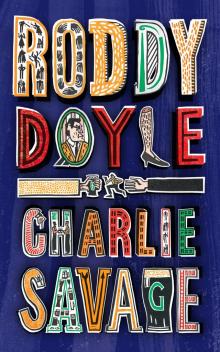 Charlie Savage
Charlie Savage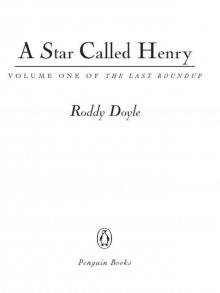 A Star Called Henry
A Star Called Henry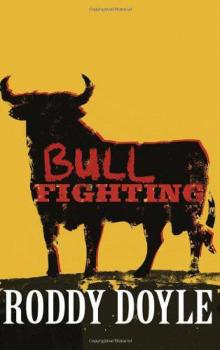 Bullfighting: Stories
Bullfighting: Stories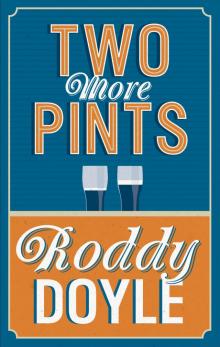 Two More Pints
Two More Pints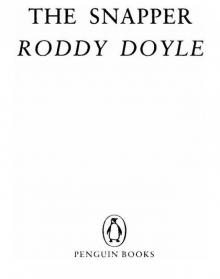 The Snapper
The Snapper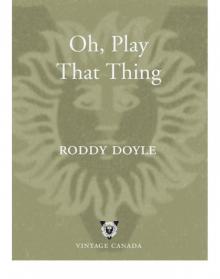 Oh, Play That Thing
Oh, Play That Thing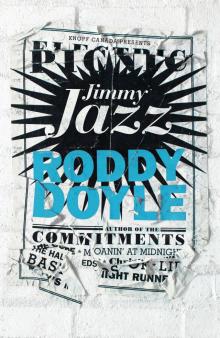 Jimmy Jazz
Jimmy Jazz Paula Spencer
Paula Spencer Wilderness
Wilderness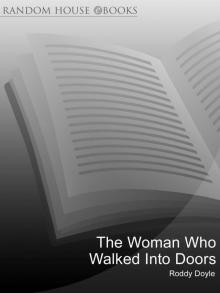 The Woman Who Walked Into Doors
The Woman Who Walked Into Doors The Deportees
The Deportees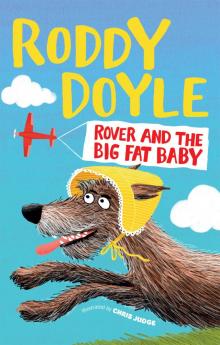 Rover and the Big Fat Baby
Rover and the Big Fat Baby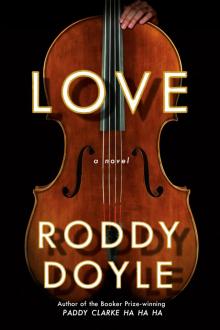 Love
Love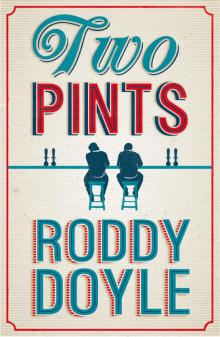 Two Pints
Two Pints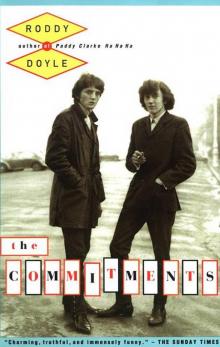 The Commitments b-1
The Commitments b-1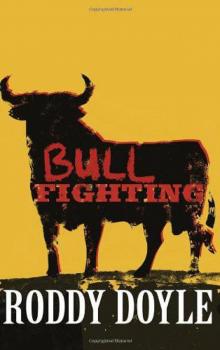 Bullfighting
Bullfighting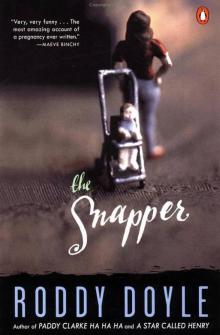 The Snapper b-2
The Snapper b-2